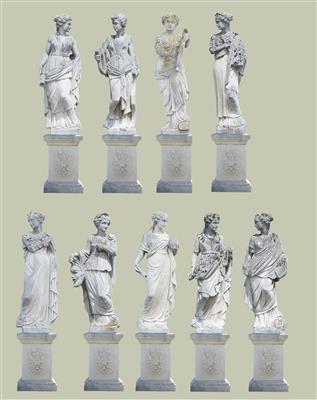Rare series of 9 muses,

naturalistically carved sandstone, 19th century, on plinths, exfoliation, small parts missing, signs of age and weathering, height 160 - 165 cm each, plinths c. 75 cm each. (DOC)
Muses are the patrons of the arts in Greek mythology. The tradition concerning the nine muses as we know them today goes back to Hesiod. Hesiod (6th century BC) in his Theogony (a description of the creation of the world and of the origins and genealogies of the Greek gods; it belongs to the oldest sources of Greek mythology, along with Homer’s Odissey and Iliad - c. 700 BC ) fixes the number of muses at nine; according to this account, they are the daughters of Mnemosyne, the goddess of memory, and Zeus. They are called Mnemonides or Olympian Muses. However, Hesiod did not assign any specific competence or attributes to them. These were differentiated only later, but even then the attribution of functions and roles still varied somewhat arbitrarily. Only in a later period did functions and attributes become more stably linked to specific names:
Clio, the proclaimer, is the muse of history (attributes: parchment scroll and writing pen)
Melpomene, the melodious one, is the muse of tragedy (attribute: tragic mask, wreath of vine leaves, probably also a knife or club)
Terpsichore, delight in dancing, is the muse of dance and the dramatic chorus (attribute: lyre)
Thalia, the joyous, the flourishing, is the muse of comedy (attribute: comic mask, wreath of ivy and shepherd’s staff, since she is also the muse of cheerful bucolic poetry)
Euterpe, the giver of delight, is the muse of lyric poetry and flute playing (attribute: aulos, the double-flute)
Erato, the desired, lovely one, is the muse of erotic poetry (attribute: string instrument, lyre)
Urania, the heavenly one, is the muse of astronomy (attribute: celestial globe and staff)
Polyhymnia, the one of many hymns. She is the muse of the song with the lyre (no specific attribute, sometimes the lyre)
Calliope, the beautiful-voiced, is the muse of epic poetry, rhetoric, philosophy and science (attribute: writing tablet and pen)
Provenance: formerly from a villa in Istria (Croatia), then German aristocratic collection
Specialist: Alexander Doczy
 Alexander Doczy
Alexander Doczy
+43-1-515 60-302
alexander.doczy@dorotheum.at
12.09.2013 - 17:00
- Estimate:
-
EUR 85,000.- to EUR 95,000.-
Rare series of 9 muses,
naturalistically carved sandstone, 19th century, on plinths, exfoliation, small parts missing, signs of age and weathering, height 160 - 165 cm each, plinths c. 75 cm each. (DOC)
Muses are the patrons of the arts in Greek mythology. The tradition concerning the nine muses as we know them today goes back to Hesiod. Hesiod (6th century BC) in his Theogony (a description of the creation of the world and of the origins and genealogies of the Greek gods; it belongs to the oldest sources of Greek mythology, along with Homer’s Odissey and Iliad - c. 700 BC ) fixes the number of muses at nine; according to this account, they are the daughters of Mnemosyne, the goddess of memory, and Zeus. They are called Mnemonides or Olympian Muses. However, Hesiod did not assign any specific competence or attributes to them. These were differentiated only later, but even then the attribution of functions and roles still varied somewhat arbitrarily. Only in a later period did functions and attributes become more stably linked to specific names:
Clio, the proclaimer, is the muse of history (attributes: parchment scroll and writing pen)
Melpomene, the melodious one, is the muse of tragedy (attribute: tragic mask, wreath of vine leaves, probably also a knife or club)
Terpsichore, delight in dancing, is the muse of dance and the dramatic chorus (attribute: lyre)
Thalia, the joyous, the flourishing, is the muse of comedy (attribute: comic mask, wreath of ivy and shepherd’s staff, since she is also the muse of cheerful bucolic poetry)
Euterpe, the giver of delight, is the muse of lyric poetry and flute playing (attribute: aulos, the double-flute)
Erato, the desired, lovely one, is the muse of erotic poetry (attribute: string instrument, lyre)
Urania, the heavenly one, is the muse of astronomy (attribute: celestial globe and staff)
Polyhymnia, the one of many hymns. She is the muse of the song with the lyre (no specific attribute, sometimes the lyre)
Calliope, the beautiful-voiced, is the muse of epic poetry, rhetoric, philosophy and science (attribute: writing tablet and pen)
Provenance: formerly from a villa in Istria (Croatia), then German aristocratic collection
Specialist: Alexander Doczy
 Alexander Doczy
Alexander Doczy
+43-1-515 60-302
alexander.doczy@dorotheum.at
|
Buyers hotline
Mon.-Fri.: 9.00am - 6.00pm
kundendienst@dorotheum.at +43 1 515 60 200 |
| Auction: | Property from Aristocratic Estates and Important Provenance |
| Auction type: | Saleroom auction |
| Date: | 12.09.2013 - 17:00 |
| Location: | Vienna | Palais Dorotheum |
| Exhibition: | 05.09. - 12.09.2013 |
